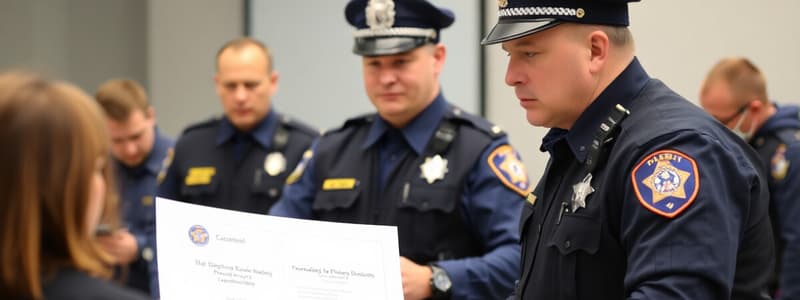Podcast
Questions and Answers
What is one of the key responsibilities of the Training Coordinator?
What is one of the key responsibilities of the Training Coordinator?
- Develop community outreach programs
- Create training manuals for the trainees
- Provide daily coaching to trainees
- Schedule and conduct training meetings with district trainers (correct)
Which aspect is NOT a responsibility of the Academy/PTO Coordinator?
Which aspect is NOT a responsibility of the Academy/PTO Coordinator?
- Incorporating Problem Based Learning principles
- Ensuring consistent training across the department
- Updating the Learning Matrix
- Conducting evaluations of trainees (correct)
What role does a Police Training Officer (PTO) serve in the training process?
What role does a Police Training Officer (PTO) serve in the training process?
- Coach and facilitator for the trainee (correct)
- Patrol officer only
- Evaluator of the training program
- Administrative supervisor of the Training Coordinator
What must be done if a trainee fails an evaluation week?
What must be done if a trainee fails an evaluation week?
What learning model must a PTO understand to effectively assist trainees?
What learning model must a PTO understand to effectively assist trainees?
Which of the following is a responsibility of the Police Training Officer?
Which of the following is a responsibility of the Police Training Officer?
In what situation is a Learning Action Plan (LAP) necessary?
In what situation is a Learning Action Plan (LAP) necessary?
Who works closely with the Training Coordinators to ensure PBL principles are applied?
Who works closely with the Training Coordinators to ensure PBL principles are applied?
What is the role of the PTO regarding the trainee's learning environment?
What is the role of the PTO regarding the trainee's learning environment?
What should the PTO prepare to help the trainee frame their learning?
What should the PTO prepare to help the trainee frame their learning?
Flashcards are hidden until you start studying
Study Notes
PTO Model Overview
- The Training Coordinator plays a crucial role in selecting and evaluating Police Training Officers (PTOs) and Police Training Evaluators.
- Training Coordinators provide training in problem-based learning (PBL) to both PTOs and trainees.
- They are responsible for administering the training program according to established guidelines.
- Regular training meetings with district trainers are required at least once per training phase.
Responsibilities of the Training Coordinator
- Must meet with each PTO/trainee team at least once per phase.
- Required to keep the Program Commander and Administrator informed of any unusual problems or learning experiences.
- Specific circumstances necessitating communication include:
- When a Learning Action Plan (LAP) may be needed due to insufficient learning.
- If a trainee fails to pass an evaluation week.
- Cases where a trainee doesn’t satisfactorily complete a LAP.
Academy/PTO Coordinator Role
- Works collaboratively with Training Coordinators, Program Administrator, and Program Commander for consistent training.
- Responsible for updating the Learning Matrix and overseeing the integration of PBL and Core Competencies to trainees at the Academy.
Police Training Officer (PTO) Role
- The PTO ranks as Corporal and is primarily responsible for the effective training of the trainee.
- Balances patrol officer duties while acting as a coach and facilitator for the trainee.
- Responsibilities include providing a supportive learning environment and serving as a role model.
Key Responsibilities of the PTO
- Familiarizes with the principles of the problem-based learning model.
- Supports the trainee’s use of the Denver Police Department Decision Making Model.
- Prepares relevant materials related to community problems for trainee learning.
- Assists trainees with Problem Based Learning Exercises (PBLEs).
- Provides advice and counsel on problems outlined in the training manual.
- Records teaching and coaching experiences, and escalates persistent concerns to the Training Coordinator.
Studying That Suits You
Use AI to generate personalized quizzes and flashcards to suit your learning preferences.




